Related Research Articles
The Soul Stirrers were an American gospel music group, whose career spans over eighty years. The group was a pioneer in the development of the quartet style of gospel, and a major influence on Soul, Doo wop, and the Motown sound, some of the secular music that owed much to gospel.
Gospel music is a traditional genre of Christian music, and a cornerstone of Christian media. The creation, performance, significance, and even the definition of gospel music varies according to culture and social context. Gospel music is composed and performed for many purposes. Including aesthetic pleasure, religious or ceremonial purposes, and as an entertainment product for the marketplace. Gospel music is characterized by dominant vocals and strong use of harmony with Christian lyrics. Gospel music can be traced to the early 17th century.

Sister Rosetta Tharpe was an American singer, songwriter and guitarist. She gained popularity in the 1930s and 1940s with her gospel recordings, characterized by a unique mixture of spiritual lyrics and electric guitar. She was the first great recording star of gospel music, and was among the first gospel musicians to appeal to rhythm and blues and rock and roll audiences, later being referred to as "the original soul sister" and "the Godmother of rock and roll". She influenced early rock-and-roll musicians including Little Richard, Johnny Cash, Carl Perkins, Chuck Berry, Elvis Presley, Jerry Lee Lewis, and also later guitarists, such as Eric Clapton.

Soul Train is an American musical variety television show. After airing locally on WCIU-TV in Chicago, Illinois for a year, it aired in syndication from October 2, 1971, to March 25, 2006. Across its 35-year history the show primarily featured performances by R&B, soul, and hip hop artists. The series was created by Don Cornelius, who also served as its first and longest-serving host and executive producer.

Louis Allen Rawls was an American baritone singer, record producer, composer and actor. Rawls released 61 albums, sold more than 40 million records, and had numerous charting singles, most notably the song "You'll Never Find Another Love like Mine". He also worked as a film, television and voice actor. He was a three-time winner of the Best Male R&B Vocal Performance Grammy Award.

James Edward Cleveland was an American gospel singer, musician, and composer. Known as the "King of Gospel," Cleveland was a driving force behind the creation of the modern gospel sound by incorporating traditional black gospel, soul, pop, and jazz in arrangements for mass choirs.

Clifton Duncan Davis is an American actor, singer, songwriter, minister, and author.

The Gospel at Colonus is an African-American musical version of Sophocles's tragedy, Oedipus at Colonus. The show was created in 1983 by the experimental-theatre director Lee Breuer, one of the founders of the seminal American avant-garde theatre company Mabou Mines, and composer Bob Telson. The musical was a finalist for the Pulitzer Prize for Drama. The show had a brief run on Broadway in 1988.

Wynona Merceris Carr was an American gospel, R&B and rock and roll singer-songwriter, who recorded as Sister Wynona Carr when performing gospel material.

Dione Taylor is a Canadian blues, roots, soul and jazz singer/songwriter, born and raised in Regina, Saskatchewan. Dione calls her music the “Prairie Blues”, which is a mixture of Roots, Blues, Gospel and Americana. She is influenced by vocalists such as Aretha Franklin, Sister Rosetta Tharpe, Son House and Sarah Vaughan. She released her first album, Open Your Eyes, in 2004, and it was nominated for Vocal Jazz Album of the Year at the Juno Awards of 2005.
Traditional black gospel is music that is written to express either personal or a communal belief regarding African American Christian life, as well as to give a Christian alternative to mainstream secular music. It is a form of Christian music and a subgenre of black gospel music.
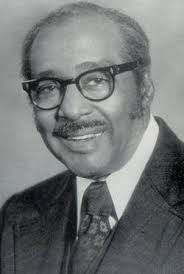
Dr. William Herbert Brewster, Sr. was an influential African American Baptist minister, composer, dramatist, singer, poet and community leader.
The Gospel Of Gospel is a 2001 TV documentary made by independent production company Lion Television for Channel 4 in the UK. It was presented by the singer Mica Paris. It was produced and directed by David Upshal.
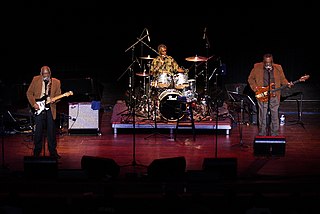
The Holmes Brothers were an American musical trio originally from Christchurch, Virginia. Mixing sounds from blues, soul, gospel, country, and rhythm & blues, they have released twelve studio albums, with three reaching the top five on the Billboard Blues Albums chart. They have gained a following by playing regularly at summer folk, blues, gospel, and jazz festivals. They have recorded with Van Morrison, Peter Gabriel, Odetta, Phoebe Snow, Willie Nelson, Freddie Roulette, Rosanne Cash, Levon Helm and Joan Osborne, and have gigged all over the world—including performing for President Bill Clinton. They won the Blues Music Award from the Memphis-based Blues Foundation for Band of the Year in 2005 and for the Soul Blues Album of the Year in 2008.
"This Train", also known as "This Train Is Bound for Glory", is a traditional American gospel song first recorded in 1922. Although its origins are unknown, the song was relatively popular during the 1920s as a religious tune, and it became a gospel hit in the late 1930s for singer-guitarist Sister Rosetta Tharpe. After switching from acoustic to electric guitar, Tharpe released a more secular version of the song in the early 1950s.
The McDonald's Gospelfest is an annual gospel music festival, talent competition, and fundraiser in Newark, New Jersey.
Black gospel music, often called gospel music or gospel, is the traditional music of the Black diaspora in the United States. It is rooted in the conversion of enslaved Africans to Christianity, both during and after the trans-atlantic slave trade, starting with work songs sung in the fields and, later, with religious songs sung in various church settings, later classified as Negro Spirituals.
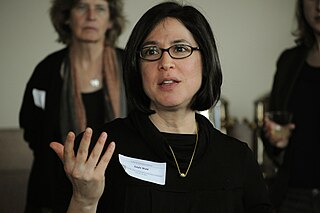
Gayle Wald is a professor of English and American Studies at George Washington University and a Guggenheim Fellow. From 1994-95 she was Visiting Assistant Professor of English and American Studies at Trinity College in Hartford, Connecticut.
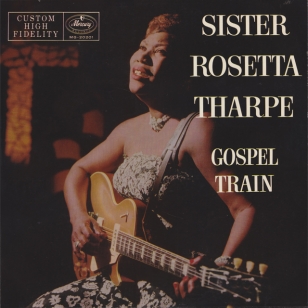
Gospel Train is a studio album by gospel and R&B artist Sister Rosetta Tharpe, recorded in July 1956 and released in December the same year. Tharpe is accompanied on vocals by the traditional black gospel quartet the Harmonizing Four on some of the songs. The album was noted as part of Tharpe's induction to the Rock and Roll Hall of Fame.
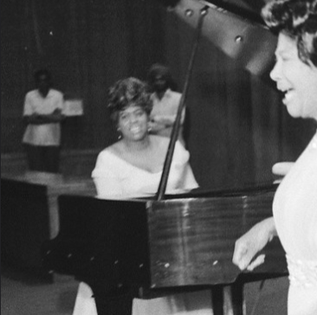
Gwendolyn Rosetta Capps Lightner was an American gospel pianist, arranger, and choir director and an influential figure within the Los Angeles gospel community. She was best known for her work as accompanist for Mahalia Jackson, and she was also a session musician for recordings by the Pilgrim Travelers, the Soul Stirrers, Brother Joe May, and Doris Akers. Lightner was also an active leader within the Baptist church for many years. Bernice Johnson Reagon, scholar, founder of Sweet Honey in the Rock, and curator emeritus in the Division of Community Life and the Smithsonian Institution's National Museum of American History called Lightner "a brilliant exponent of classical gospel playing."
References
- ↑ "Billboard Music Week, October 20, 1962". 20 October 1962. Retrieved 4 September 2021.
- 1 2 "Carolina Times - January 12, 1963" (PDF). Carolina Times. Retrieved 2021-09-07.
- ↑ "Baltimore Sun - October 14, 1962". Newspapers. Retrieved 2021-09-05.
- 1 2 3 4 5 6 "Billboard - October 23, 1965" (PDF). World Radio History. Retrieved 2021-09-05.
- ↑ "BShout, Sister, Shout: The Untold Story of Rock n Roll Trailblazer Rosetta Tharpe". EPDF. Retrieved 2021-09-05.
- ↑ "Florida Star - February 2, 1963". UF Florida. Retrieved 2021-09-05.
- 1 2 3 "Broadcasting - June 15, 1964" (PDF). World Radio History. Retrieved 2021-09-05.
- ↑ "TV Gospel Time - Jazz On Film". Jazz On Film. Retrieved 2021-09-07.
- ↑ "RIP: Professor Alfred E Miller". Journal of Gospel Music. January 13, 2016. Retrieved 2021-09-10.
- ↑ Nations, Opal (November 2006). "The Georgia Louis Story - Blues & Rhythm 214" (PDF). Articles by Opal Nations. Retrieved 2021-09-05.
- ↑ "O'Neal Twins - Opal Louis Nations, 1995". Yumpu. Retrieved 2021-09-05.
- ↑ "Georgia Louis Obituary - Stamford, CT". Dignity Memorial. Retrieved 2021-09-04.
- ↑ Wald, Gayle (2012-12-28). "Timeline: The Years of Sister Rosetta Tharpe". American Masters. Retrieved 2021-09-04.
- ↑ "'How Sweet It Was': The Cultural Impact Of Gospel". NPR.org. Retrieved 2021-09-04.
- ↑ "Gospel Music Pioneers Who Paved The Way". KGEB TV 53. Retrieved September 7, 2021.
- ↑ "Celluloid Improvisations ♫ WATCH". Celluloid Improvizations. Retrieved September 10, 2021.
- ↑ "O'Neal Twins - Opal Louis Nations, 1995". Yumpu. Retrieved 2021-09-05.
- ↑ "RIP: Professor Alfred E Miller - Journal of Gospel Music Janu 13, 2016". Journal Of Gospel Music. 13 January 2016. Retrieved 2021-09-10.
- ↑ "Carrie Smith Biography - All Music". All Music. Retrieved 2021-09-07.
- ↑ "Soul Of The Church - Chicago, IL". Journal of Gospel Music. 7 April 2010. Retrieved 2021-09-04.